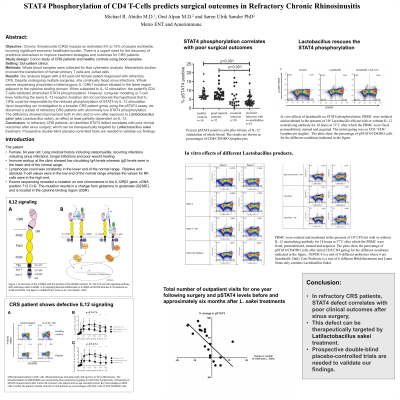Rhinology/Allergy
(1231) STAT4 Phosphorylation of T-Helper Cells Predicts Surgical Outcomes in Refractory Chronic Rhinosinusitis
Monday, September 30, 2024
12:00 PM - 1:00 PM EDT

Has Audio
Disclosure(s):
MICHAEL R. ABIDIN, MD: No relevant relationships to disclose.
Introduction: Successful treatment of patients with chronic rhinosinusitis can be difficult in some patients. We have identified a blood test that can help diagnose and treat some of these patients
Methods: Whole blood samples were collected for flow cytometric analysis in both normal controls and those that did not respond well to endoscopic sinus surgery. Whole exome sequencing was deployed . Mechanistic studies involved the transfection of primary T cells and Jurkat cells. STAT4 phosphorylation of T helper cells was measured in response to stimulation with Il-12. Treatment of patients that expressed low levels of response to Il 12 were treated with L. Sakei.
Results: Whole exome sequencing pinpointed a heterozygous IL-12Rb1 mutation. When subjected to IL 12 stimulation, the patients CD4 T-cells exhibited diminished STAT4 phosphorylation. Computer modeling or T cell lines harboring the same IL12 receptor mutation did not corroborate the hypothesis that IL-12Rb could be solely responsible could be responsible for the reduced phosphorylation of STAT4 by IL12 stimulation. We discerned a subset of refractory CRS patients with abnormally low STAT 4 phosphorylation. The deficiency showed improvement after exposure to Lactobacillus sakei , an effect at least partially dependent on IL-12.
Conclusions: In refractory CRS patients, an identified STAT4 defect correlates with poor clinical outcomes after sinus surgery, which can be therapeutically targeted by Lactobacillus Sakei treatment.
- MA
MICHAEL R. ABIDIN, MD
Author
Metropolitan ENT & Facial Plastic Surgery
ALexandria, Virginia, United States - OA
Oral Alpan, MD
Amerimmune
mclean, Virginia, United States
